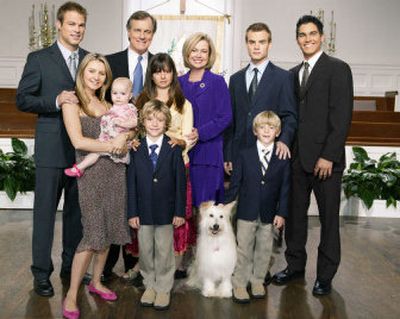Farewell to ‘Heaven’

After a long and prosperous run, “7th Heaven” says farewell on Monday.
Chances are, some Hollywood people won’t even notice that it’s gone. They never noticed it was there.
“It sort of dawns on you: The industry doesn’t really know about the show,” says co-star Catherine Hicks. “(But) the world knows about the show.”
For at least seven of its 10 seasons, “7th Heaven” was the most-watched show on the WB network. One of the last of TV’s family dramas, it’s the first of many long-running shows that will have their farewell episodes this month.
The others – from “The West Wing” to “Will & Grace” – have had a big impact in Hollywood. By comparison, “7th Heaven” was often ignored; that started even before its 1996 debut.
“I’m pretty sure someone else had turned it down before I got the script,” says series star Stephen Collins. “I’m not sure he read it.”
There was no reason to take it seriously then. The network was only starting its second full season, expanding from two nights a week to three.
“The WB really had no profile then,” Collins says. “(Producer) Aaron Spelling hadn’t done a show like this in a long time.”
“Heaven” was a gimmick-free drama about a modern family. Collins and Hicks played the parents of five photogenic kids, ages 5 to 16.
Halfway through the first episode, viewers learned that Collins’ character is a clergyman.
“I had in mind a minister friend in New York, who’s just the coolest reverend ever,” says Brenda Hampton, who created the show and stayed as executive producer.
The show would keep changing, often to match its young actors.
Jessica Biel, who played Mary, created a sexier image away from “7th Heaven.” She left after six years, but came back for some episodes, including Monday’s finale.
Barry Watson, who played her older brother Matt, was diagnosed in 2002 with Hodgkin’s disease.
“He did have the most beatable form of cancer,” Collins says. “All of us took our cue from Barry, who refused to get discouraged.”
Watson dropped out of the show but remained on staff as a writer. He was in remission within a year and now stars in ABC’s new show “What About Brian.”
The younger actors also changed. Beverley Mitchell points to her character, Lucy, who was 12 when the show started.
“In 10 years, you’ve been able to see her go through the scares of being a teenager and … never really gelling in her own skin, to finally finding herself and becoming a wife, becoming a minister, having a child,” Mitchell says. “You’ve seen Lucy come full-circle.”
David Gallagher, whose character Simon was 10 when the show started, transformed physically. “He’s this strapping young man now,” Collins says.
The biggest physical transformation involved Mackenzie Rosman, who plays Ruthie. When the show started, she was 6, and the directors often caught her staring at the camera.
“I thought because I didn’t turn my head, you couldn’t see my eyes moving,” she recalls.
Now she’s 16 and eye-catching. “I think Mac looks absolutely beautiful,” says Gallagher.
Early this season, the two had no scenes together and Gallagher hadn’t seen Rosman in months.
“He didn’t even recognize me,” she says. “I gave him a hug; he was like, ‘Who is this?’ “
The show added twin babies in 1999 and kept throwing in extra people. Despite the changes, the characters seemed to be good people; so did the actors.
“Aaron (Spelling) has always had uncanny casting instincts,” Collins says. “I think most of the nice choices were his.”